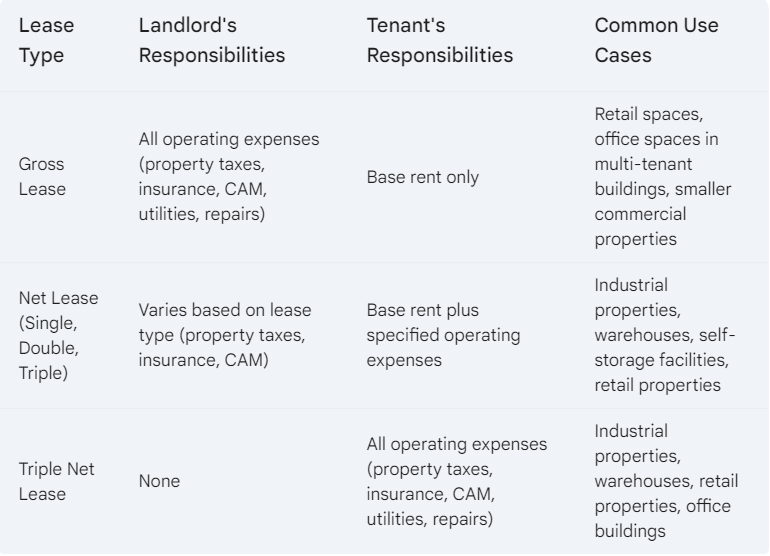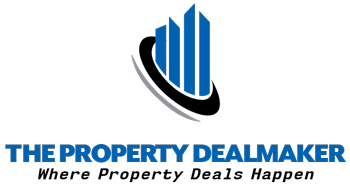Understanding Lease Types: A Guide for Commercial Property Investors
When investing in commercial property, one of the most critical factors to consider is the type of lease agreement you plan to sign or the type of lease s that are currently signed on the property you are considering.
The lease structure significantly impacts the financial performance of your investment.
There are three main lease types: gross leases, net leases, and triple net leases.
In this article we will cover the differences between these leases, as well as the advantage and disadvantages of each.
Gross Leases
A gross lease is the simplest form of lease agreement.
Under this structure, the landlord is responsible for covering all operating expenses associated with the property, including:
- Property taxes
- Insurance premiums
- Common area maintenance (CAM) charges
- Utilities (e.g., electricity, water)
- Repairs and maintenance
In essence, the tenant pays a fixed monthly rent that includes all these expenses.
For example, in an industrial property where the rental rate is R50/sqm per month, this amount will include all costs.
This means that the landlord who signs a lease like this, has to pay for all costs such as:
- Rates and taxes
- Sewer
- refuse collection
- Insurance
- Maintenance
- Water
- Electricity
- Rent collection
- Security
- Auditing
- Management fees
This type of lease appeals more to tenants.
The predictability can be attractive to tenants, especially small businesses or those with limited financial resources.
Advantages for Landlords:
- Predictable income stream
- Reduced management responsibilities from an admin perspective (since you issue one simple invoice each month)
Disadvantages for Landlords:
- Potential for increased operating costs over time
- Limited flexibility in adjusting rental rates
- Possible reduction in nett income, especially if expenses increase, which can lead to lower property value.
Advantages for Tenants:
- Predictable monthly expenses
- Minimal management responsibilities
Disadvantages for Tenants:
- Limited control over operating costs
- Potential for higher rental rates compared to net leases
Common Use Cases:
- Retail spaces in shopping malls
- Office spaces in multi-tenant buildings
- Smaller commercial properties
Gross leases are often used in situations where the landlord desires a stable income stream and is willing to absorb the risk of fluctuating operating costs.
This type of lease is particularly common in retail properties, where tenants may have limited financial resources or prefer a fixed monthly expense.

Net Leases
Net leases, also known as single net, double net, or triple net leases, shift a portion or all of the operating expenses from the landlord to the tenant.
This type of lease provides more flexibility for landlords to adjust rental rates based on changing market conditions.
Single Net Lease:
- The tenant is responsible for paying property taxes in addition to the base rent.
Double Net Lease:
- The tenant is responsible for paying property taxes and insurance premiums in addition to the base rent.
Net leases offer landlords greater control over their property’s financial performance, as they can pass through increased operating costs to tenants.
However, tenants may face higher overall costs and may need to manage property maintenance and administrative tasks.
An example of how this may work is, taking from the previous example, the landlord still charges R50/sqm for the rental.
However they also charge a recovery rate of an additional R15/sqm for the tenants contribution towards expenses.
Note that under Net leases, the landlord will still pay the following:
- Rates and taxes
- Insurance
- Building Maintenance
Other costs are recovered from the tenant.
Advantages for Landlords:
- Greater control over property expenses
- Potential for increased rental income
- Reduced management responsibilities
Disadvantages for Landlords:
- Increased risk of tenant default if operating costs are high
- Potential for tenant dissatisfaction
Advantages for Tenants:
- Potential for lower base rent
- Greater control over property management
- Opportunity to negotiate favorable terms
Disadvantages for Tenants:
- Higher overall costs due to additional expenses
- Increased management responsibilities
Common Use Cases:
- Industrial properties
- Warehouses
- Self-storage facilities
- Retail properties (especially larger, high-profile locations)
Net leases are often used in commercial properties where tenants have the financial resources and expertise to manage property operations.
This type of lease is particularly common in industrial and warehouse properties, where tenants may have specialized requirements or prefer to have greater control over their operating costs.
Triple Net Leases
A triple net lease, also known as a NNN lease, is the .best lease option when cash flow predictability is needed.
Under this structure, the tenant is responsible for paying all operating expenses associated with the property (all expenses mentioned above), including:
- Property rates and taxes
- Insurance premiums
- Repairs and maintenance
In essence, the tenant becomes the de facto property manager, responsible for all costs associated with the property’s operation.
This type of lease provides landlords with a predictable income stream and minimal management responsibilities.
Triple nett leases are normally used with single tenant buildings, where the tenant pays for all the running costs of the property.
The property owner in turn receives a rental equivalent to the net operating income, from which only the bond repayment amount needs to be paid.
Triple nett leases are normally also signed for longer lease terms like 5 or even 10 years long.
Note that leases signed for 10 years or more need to be registered against the title deed of the property at the Deeds Office.
For this reason, when a 10 year lease is being signed, landlords and tenants normally sign the lease for 9 years and 11 months, which does not require registration at the Deeds Office.
Advantages for Landlords:
- Predictable income stream
- Minimal management responsibilities
- Potential for higher rental income
- Reduced risk of tenant default
- Ability to raise higher debt from banks due to the predictability of the cash flow
Disadvantages for Landlords:
- Limited flexibility in adjusting rental rates
- Potential for tenant dissatisfaction if operating costs are high
Advantages for Tenants:
- Potential for lower base rent
- Greater control over property management
- Opportunity to negotiate favorable terms
Disadvantages for Tenants:
- Higher overall costs due to additional expenses
- Increased management responsibilities
- Risk of unexpected expenses
Common Use Cases:
- Industrial properties
- Warehouses
- Retail properties (especially larger, high-profile locations)
- Office buildings (especially those with multiple tenants)
This type of lease is often used in industrial and warehouse properties, where tenants have the financial resources and expertise to manage property operations.
However, triple net leases can also be used in retail and office properties, especially for larger, high-profile locations.
Examples of Triple Net Leases in South Africa:
- A large distribution center leased to a multinational retailer
- A warehouse facility leased to a logistics company
- A corporate office headquarters leased to a large corporation (eg. BP or Nestle)
When considering a triple net lease, it is essential for both landlords and tenants to carefully review the lease agreement to ensure that all responsibilities and costs are clearly defined.
Tenants should also have a clear understanding of the property’s condition and any potential maintenance issues that may arise.
Comparing the Three Lease Types

Factors to Consider When Choosing a Lease Type:
- Financial resources: Tenants with limited financial resources may prefer a gross lease, while those with greater financial capacity can handle net or triple net leases.
- Management expertise: Tenants with the expertise to manage property operations may prefer net or triple net leases.
- Risk tolerance: Landlords who prefer a predictable income stream may opt for gross or triple net leases, while those seeking greater flexibility may choose net leases.
- Market conditions: The prevailing market conditions and tenant demand can influence the choice of lease type.
Advice for Commercial Property Investors:
- Thoroughly review lease agreements: Ensure that all terms and conditions are clearly understood.
- Consider the long-term implications: Evaluate how the lease type will impact your investment returns and management responsibilities.
- Seek professional advice: Consult with a commercial property specialist, attorneys or property managers for guidance.


Aslam is from Johannesburg, South Africa and graduated with a BComm degree from the University of South Africa and followed that up with a BComm Hons degree in Finance and Investments.
He has spent over 18 years in the financial services sector, with 12.5 years in the commercial property finance arena with 3 of the major banks in the country.
His specialty being deal structuring and finance solutions for commercial property investors and developers across the commercial property sector, including large scale retail developments, high density residential investments , industrial and office property.
Aslam was also a fast food franchise investor for 7 years, is experienced in digital marketing and online lead generation and has owned and managed multiple residential properties.







